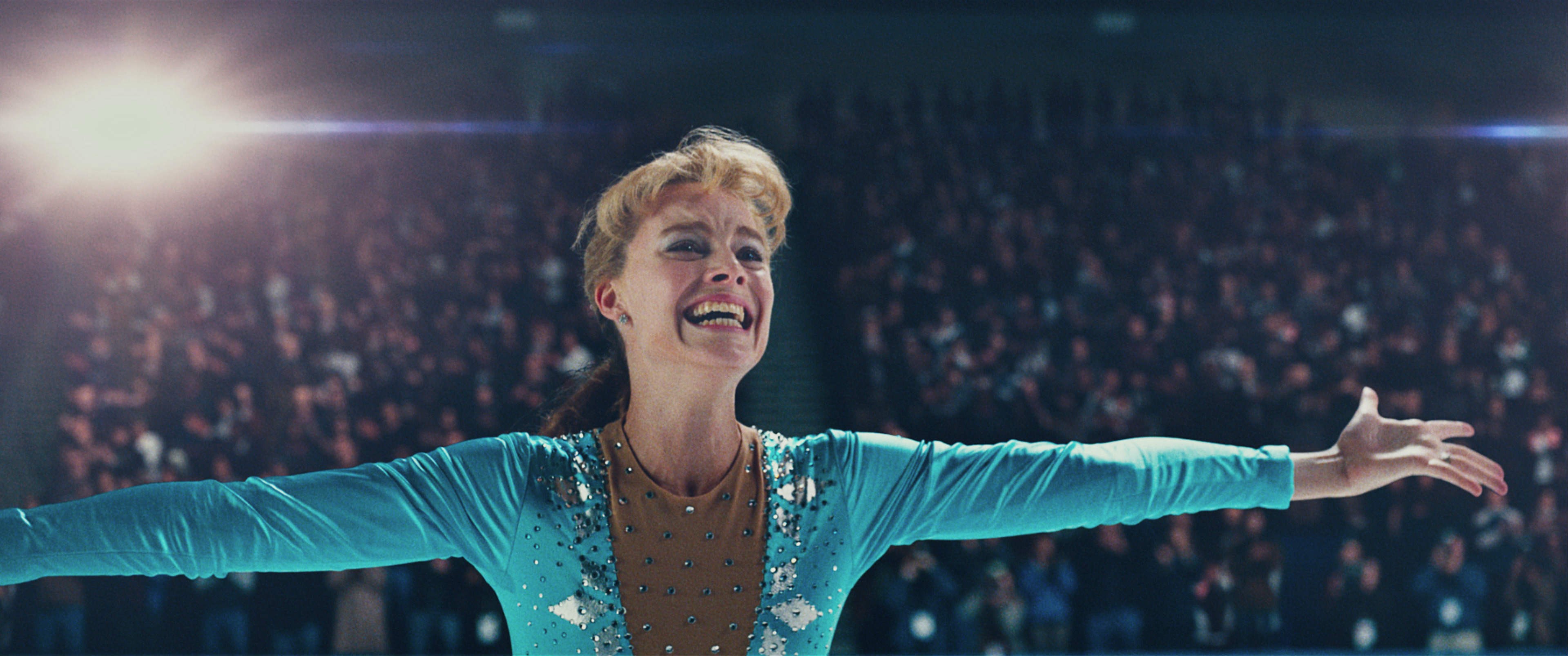This year’s Oscar race is heating up—though to be fair, we say that every year. Despite the hype, the Oscars are a predictable affair: A political game wherein undeserving films collect awards because Academy voters (largely white, older males) feel nostalgic for their youth or wish to celebrate themselves and their glorious industry.
You know who the unsung heroes are? Those inanimate objects who aid actors and directors in their quest to make us feel something. The volleyball mourned by Tom Hanks, mysterious twig dolls left behind by a Blair Witch, IT’s red balloon, Kane’s rosebud sled, the stupid plastic wind-blown bag in American Beauty; these guys do more on-screen work than anyone, but receive no accolades. They are manhandled by prop masters and PAs, yet remain patient, resigned. Determined to do their job.
So hear this, Academy: You should reward these insentient beings. There’s more life in them than in Ryan Gosling. Presenting the Best Supporting Inanimate Objects of the year.
Fair warning: spoilers ahead!
 The pair of shorts Elio puts on his head in Call Me By Your Name
The pair of shorts Elio puts on his head in Call Me By Your Name
This one is admittedly raunchy: When lovestruck teenager Elio finds a wet pair of orange swim trunks hanging from the bed of Oliver, his father’s graduate student, he promptly puts them over his head. Madly in lust with his summer roommate, Elio longs to be near Oliver and to inhale…well, the scent of his crush’s private parts. He even makes a move like he’s going to start humping the bed, but then thinks better of it. The entire film is essentially a showcase for Armie Hammer’s muscular, tanned thighs busting out of dangerously short shorts, yet Elio finds only this particular pair worthy of nearly cutting off his air supply.
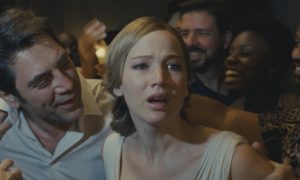 The sink that wasn’t braced yet in Mother!
The sink that wasn’t braced yet in Mother!
“That sink isn’t braced yet!” hollers Mother to a team of post-funeral ruffians who have invaded her home. Perched impertinently atop her kitchen sink, the uninvited guests don’t believe they could possibly cause any damage to Mother’s house (kind of like…human beings and our destruction of the earth). As these people bounce up and down to prove her wrong, the sink breaks beneath their weight. Everything is soaked, and Mother makes everyone get out (kind of like…The Flood wiping out human beings). Eventually, her home and baby are torn apart by more ravenous randos. That sink, though, did not deserve any of this. Maybe if Mother had braced it, it could have withstood the weight of water and ignorance and Darren Aronofsky’s overbearing metaphors.
The egg timer she sets to masturbate in The Shape of Water
The interspecies sex gets all the glory here, but let us not forget that before meeting her fishy BF, mute heroine Eliza set an egg timer every morning so she could masturbate in the bath before work. It’s part of a daily routine, and good on del Toro for treating female sexuality as something natural. But one has to wonder: Why a timer for this act? If she forgot to set it, would Eliza go on for too long and be late? Or perhaps it’s a game: “Can I finish before the timer goes off?” Seems stressful—but who are we to judge. I suppose we’re meant to observe this repetition and pity Eliza’s stasis. Any sort of schedule becomes dull after a time, even one involving erotic pleasure. Thank god she meets someone and breaks out of her mold. The timer’s shape is also prophetic, as Eliza later bonds with her aquatic lover after using eggs to tempt him. She even teaches him egg in sign language. Awww. These two kids.
https://www.youtube.com/watch?v=U-mPlb–MWc
Permed wigs worn by Margot Robbie for I, Tonya
Margot Robbie as Tonya Harding seemed like a stretch, at first. While Harding was an incredible athlete, powerful and strong, Robbie looks like a woman sculpted from the collective fantasies of thirteen-year-old boys the world over. Since Robbie’s silky tresses weren’t going to cut it, the actress wore wigs for the role, permed and colored within an inch of their lives and trimmed with bangs hovering an unnatural two inches off the face. To get that crunchy texture beloved by the ’80s, hair stylists actually poured beer on her wigs. Harding was less refined and feistier than most figure skaters of her day—plus, able to land the elusive triple axel—and the badly bleached hair was an important part of the non-traditional look she felt judges held against her in competition. So to all those wigs drenched in bud in honor of their craft: We salute you.
 The car keys she pretends to look for in Get Out
The car keys she pretends to look for in Get Out
Chris is meeting the parents of his girlfriend Rose. They don’t see race, she assures him. They would’ve voted for Obama a third time! Although a little uncomfortable visiting an all-white suburb as a black dude, Chris rallies—before realizing he should have trusted his instincts instead. In a pivotal scene, Chris has grown suspicious of Rose’s family, and sensing he’s in imminent danger, moves toward the front door to escape. But her family approaches, circling like sharks. Rose searches tearfully for the car keys in her handbag as Chris urges her to look faster. Her brother is brandishing a lacrosse stick. Rose seems frantic, every bit as frightened as Chris, until suddenly she holds the missing item up and very cooly says to him, “You know I can’t give you the keys, right, babe?” In this instant, it’s apparent Rose has been complicit from the start. A girl our protagonist loved served him up like a lamb for the slaughter; sold to a family who hypnotize black men and transfer the brains of ailing white people into their healthy bodies, rendering them paralyzed. Oldest story of betrayal in the book. Rose knew where those pesky keys were all along, but every woman’s handbag is an ocean of secrets, so who can blame Chris for believing in her.
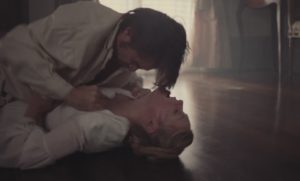 The buttons that go flying during sex in The Beguiled
The buttons that go flying during sex in The Beguiled
In this southern Gothic remake, a group of lonely ladies at a girl’s school take in a wounded Civil War soldier. While every woman in the school is attracted to McBurney—bringing the recovering guest gifts and competing for his gruff attentions—it’s teacher Edwina he is most taken with. He makes love declarations to her, then gets caught in bed with another girl and falls down the stairs, breaking a leg. The women must amputate it in order to save his life; but McBurney does not take kindly to this, assuming they have malicious intent, and threatens them with violence. (Typical man—you help him and he resents it.) Perhaps aroused by all this chaos, Edwina and McBurney make love; in a scene where repressed passions overflow, he tears off her tight-collared dress and buttons scatter everywhere. Reckless abandon. Actress Kirsten Dunst said her character Edwina lost her virginity to McBurney here, as there have been scant men available during the war. Having sex for the first time with a one-legged dude who recently screwed one of your underage students isn’t ideal, but worry not—McBurney gets his. And while those buttons did their best in keeping Edwina’s dignity intact, it probably felt good for them to be set loose.
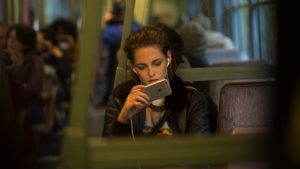 Three text message dots in Personal Shopper
Three text message dots in Personal Shopper
Celebrity shopper Maureen is mourning the loss of her twin brother Lewis. Both siblings are “mediums,” able to communicate with the departed, and Maureen hopes her brother will contact her from beyond the grave. When she begins receiving taunting iPhone messages from an anonymous source, Maureen both hopes it is her brother and suspects it is not. Three ominous typing text message dots—you know the ones—are scary whether they indicate your SO is responding to a risky text or that a possible spirit has your cell number. Suspense builds each time those innocuous gray circles appear, the moment like a digital Schrödinger’s cat—as the animal is simultaneously dead and alive before you’ve checked it, those dots hold endless possibilities prior to their conclusion in a text. They at once represent the cruelest or kindest message you’ve ever received. More frightening still? Maureen’s haunter has his iPhone read receipts turned on. That’s a ghost who is not afraid of anything.
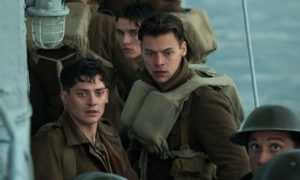 Harry Styles’s hair in Dunkirk
Harry Styles’s hair in Dunkirk
OK, so hair is technically alive. It grows. But you can cut it without hurting it, so that qualifies for the inanimate awards. And Harry Styles has great hair. Admittedly, he isn’t in a whole lot of this movie, about the evacuation of Allied troops from the city of Dunkirk during WWII—probably about eight minutes total—but Harry’s ’do steals the show. Though a newcomer to the acting game, he’s a natural on screen, blending in with the rest of the seasoned cast. There isn’t much dialogue or character development even amongst those with larger roles; the chaos of war swells and we are immersed in the action without getting to know anyone in particular. Harry, to his credit, alternatingly gnaws on some bread, lies prostrate on a beach, and tries to sacrifice a Frenchman to save his own ass, all while maintaining hair that’s shiny, bouncy, and full. Maybe he’s born with it. Maybe it’s the stress of a warzone.
A People’s History of the United States book in Lady Bird
This marks the second item on our list to have been cradled in the loving arms of Timothée Chalamet (he also plays Elio in CMBYN). When the titular Lady Bird first meets high school heartthrob Kyle outside a coffee shop, he is reading Howard Zinn’s A People’s History of the United States. She is immediately charmed by his apparent intellect. Lady Bird doesn’t seem expressly interested in politics or history herself—though she’s certainly ashamed of her family’s middle-class standing, pretending to be rich whenever she gets the chance—but she’s the type of girl who would like to be seen as politically engaged, thus her attraction to Kyle and his bookish sensibilities. “What you do is very baller,” he tells her when she vandalizes someone’s car—poetry to the ears of any modern women. When Lady Bird loses her virginity to Kyle, she insists it should have been more special; in response, Kyle brings up the number of people killed in the Iraq War. She’s unimpressed with this dismissal, and he scoots across the bed to read more APHUS.

